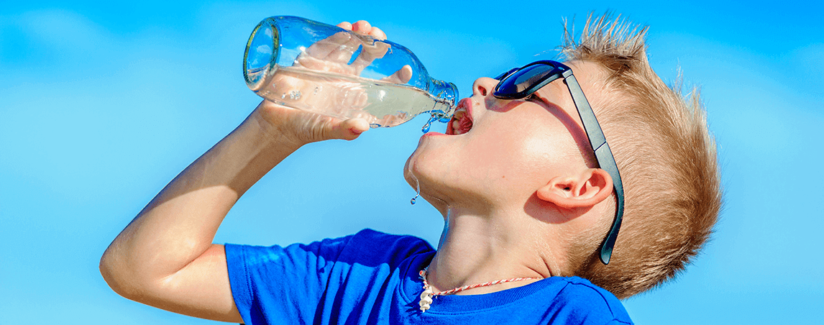
How Much Water Do You Need to Stay Hydrated?
06/21/2018
Warm weather can bring about a rush of outdoor excursions, backyard bashes and lounging in the sun. In this crazy mix of activity, it can be easy to forget to drink water and hydrate.
“We are kind of like a grape,” said Dr. Stanley Goldfard, Associate Dean for Clinical Education and Professor of Medicine at the Hospital of the University of Pennsylvania. “When you squeeze a grape you get rid of all the water, and it becomes a little raisin. Our bodies are like that.”
Thirsty for more information we asked Dr. Goldfarb a few hydration questions about why our bodies need water.
“Our bodies are made up of 60 to 80 percent water,” Dr. Goldfarb said. “We have a need for water intake every day, mostly because we have natural water losses from our body.”
Our bodies generally take in about 2,500 milliliters (about 10.5 cups) of water a day either through the fluids we drink or through the food we eat, he said. Our natural thirst mechanism lets us know how much water we need to take in to replace the water we have lost through our skin and urine.
“Our bodies require water in order for various chemicals and proteins to function properly,” Dr. Goldfard said.
Too much water or too little can impair the cells ability to work properly. The proper balance of water in our bodies will ensure our cells are functioning properly.
We know hydration is important, but do you have to drink water to stay hydrated? Dr. Goldfarb says not necessarily.
“If you drink a soda for example, that is made up of about 95 percent water. It is still a liquid – basically water in some way,” Dr. Goldfarb said. If you prefer to drink coffee, tea or soda it is perfectly fine to drink those instead since all fluids accomplish the same thing, he said.
“I should point out that if you have problems with being overweight, it is better to drink water than sweetened beverages that can lead to excess caloric consumption,” Dr. Goldfarb said.
When it comes to hydrating, sports drinks seem to have a leg up but that is not always the case. Sports drinks do contain a small amount of electrolytes, which are basically minerals, but they often contain a large amount of sugar, as well.
“For those who are exercising at peak physical exertion in a very hot and dry climate, they may benefit from a sports drink that helps replenish lost vitamins and minerals,” Dr. Goldfarb said. “But, for the average person, under average physical strain, most sports drinks are unnecessary.”
Hydration is important but what are the consequences of not drinking enough water every day? According to Dr. Goldfarb, the consequences can vary. When we do not drink enough water we start to feel thirsty. If we continue to lose water, we can start to become dehydrated which can be dangerous if not addressed. Some signs of severe dehydration include:
- Low blood pressure
- Changes in neurological function
- Skin becomes very dry
- Intense sensations of thirst
However, just going three to four hours without drinking water will result in a slight sense of dryness in the mouth and a slight sense of thirst. At this point, less than one percent of your total body water has been lost.
“That does not mean you have reached a level of dehydration, it is just a point where you need to drink some water. But, if you let it go to a severe state, it could become a severe problem,” Dr. Goldfarb said.
A common question asked is whether drinking water can aid in weight loss. According to Dr. Goldfarb, there is no evidence to believe that is true. People who drink water right before or after a meal tend to consume the same amount of calories. “This idea of drinking water as part of a diet program really has not been shown to be effective in a controlled study,” he said.
We are often told that drinking eight glasses of water a day is a must. We asked Dr. Goldfarb if that statement is accurate.
“On a normal basis, we take in about eight glasses of water per day, and people are sometimes confused that they need to drink eight glasses above and beyond what they are already taking in. Based on your natural response to thirst, eight glasses a day is a normal amount to take in,” he said.
Dr. Goldfarb agrees with the National Academy of Science and recommends, “Drinking when you are thirsty. Unless you have a medical condition where a physician has recommended that you drink more fluid, it is perfectly healthy to drink when you are thirsty.”
To stay hydrated, drink fluids, whether water or other drinks, when you are thirsty. Most of us get enough fluids to stay hydrated through what we eat and drink, but it is essential to replenish lost fluids every day.


























